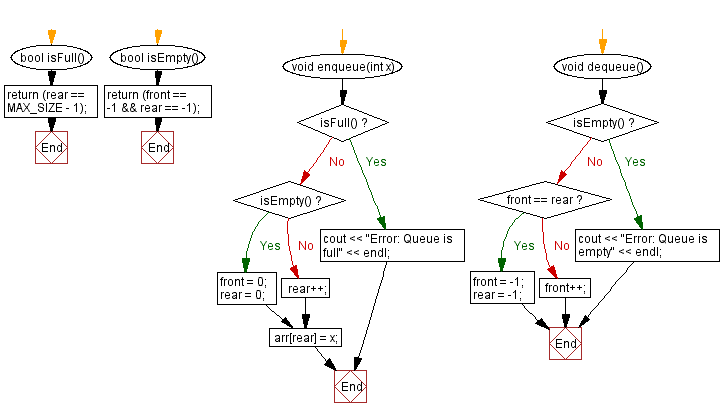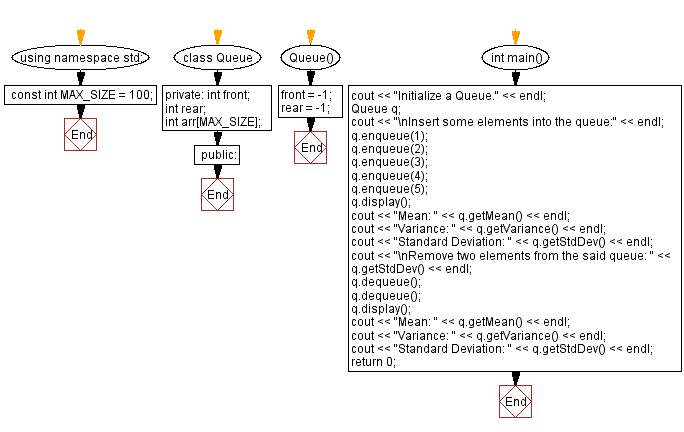C++ Queue Exercises: Mean, variance and standard deviation of all elements of a queue
8. Mean, Variance, and Standard Deviation of Queue Elements
Write a C++ program to find the mean, variance and standard deviation of all elements of a queue.
Sample Solution:
C Code:
#include <iostream>
#include <map>
#include <cmath>
using namespace std;
const int MAX_SIZE = 100;
class Queue {
private:
int front; // Front index of the queue
int rear; // Rear index of the queue
int arr[MAX_SIZE]; // Array to store elements
public:
Queue() {
front = -1; // Initialize front index to -1
rear = -1; // Initialize rear index to -1
}
bool isFull() {
return (rear == MAX_SIZE - 1); // Check if the queue is full
}
bool isEmpty() {
return (front == -1 && rear == -1); // Check if the queue is empty
}
void enqueue(int x) {
if (isFull()) {
cout << "Error: Queue is full" << endl; // Display error message if the queue is full
return;
}
if (isEmpty()) {
front = 0;
rear = 0;
} else {
rear++;
}
arr[rear] = x; // Insert the element at the rear index
}
void dequeue() {
if (isEmpty()) {
cout << "Error: Queue is empty" << endl; // Display error message if the queue is empty
return;
}
if (front == rear) {
front = -1;
rear = -1;
} else {
front++;
}
}
int peek() {
if (isEmpty()) {
cout << "Error: Queue is empty" << endl; // Display error message if the queue is empty
return -1;
}
return arr[front]; // Return the element at the front of the queue
}
void display() {
if (isEmpty()) {
cout << "Error: Queue is empty" << endl; // Display error message if the queue is empty
return;
}
cout << "Queue elements are: ";
for (int i = front; i <= rear; i++) {
cout << arr[i] << " "; // Display all elements in the queue
}
cout << endl;
}
float getMean() {
if (isEmpty()) {
cout << "Error: Queue is empty" << endl; // Display error message if the queue is empty
return 0;
}
float sum = 0;
for (int i = front; i <= rear; i++) {
sum += arr[i]; // Calculate sum of elements in the queue
}
return sum / (rear - front + 1); // Calculate and return the mean
}
float getVariance() {
if (isEmpty()) {
cout << "Error: Queue is empty" << endl; // Display error message if the queue is empty
return 0;
}
float mean = getMean();
float variance = 0;
for (int i = front; i <= rear; i++) {
variance += pow(arr[i] - mean, 2); // Calculate sum of squared differences from mean
}
return variance / (rear - front + 1); // Calculate and return the variance
}
float getStdDev() {
return sqrt(getVariance()); // Calculate and return the standard deviation using variance
}
};
int main() {
cout << "Initialize a Queue." << endl;
Queue q;
cout << "\nInsert some elements into the queue:" << endl;
q.enqueue(1);
q.enqueue(2);
q.enqueue(3);
q.enqueue(4);
q.enqueue(5);
q.display();
// Calculate and display mean, variance, and standard deviation of queue elements
cout << "Mean: " << q.getMean() << endl;
cout << "Variance: " << q.getVariance() << endl;
cout << "Standard Deviation: " << q.getStdDev() << endl;
cout << "\nRemove two elements from the said queue: " << q.getStdDev() << endl;
q.dequeue();
q.dequeue();
q.display();
// Calculate and display mean, variance, and standard deviation after removing elements
cout << "Mean: " << q.getMean() << endl;
cout << "Variance: " << q.getVariance() << endl;
cout << "Standard Deviation: " << q.getStdDev() << endl;
return 0;
}
Sample Output:
Initialize a Queue. Insert some elements into the queue: Queue elements are: 1 2 3 4 5 Mean: 3 Variance: 2 Standard Deviation: 1.41421 Remove two elements from the said queue: 1.41421 Queue elements are: 3 4 5 Mean: 4 Variance: 0.666667 Standard Deviation: 0.816497
Flowchart:



For more Practice: Solve these Related Problems:
- Write a C++ program to calculate the mean, variance, and standard deviation of elements stored in a queue using a single traversal.
- Write a C++ program to compute statistical measures of a queue by transferring elements into a vector for processing.
- Write a C++ program to update the mean, variance, and standard deviation of a queue as elements are enqueued.
- Write a C++ program to calculate the mean, variance, and standard deviation of a queue, handling both integer and floating-point data.
Go to:
PREV : Mode of Queue Elements.
NEXT : Maximum Element in a Queue.
CPP Code Editor:
Contribute your code and comments through Disqus.
What is the difficulty level of this exercise?
